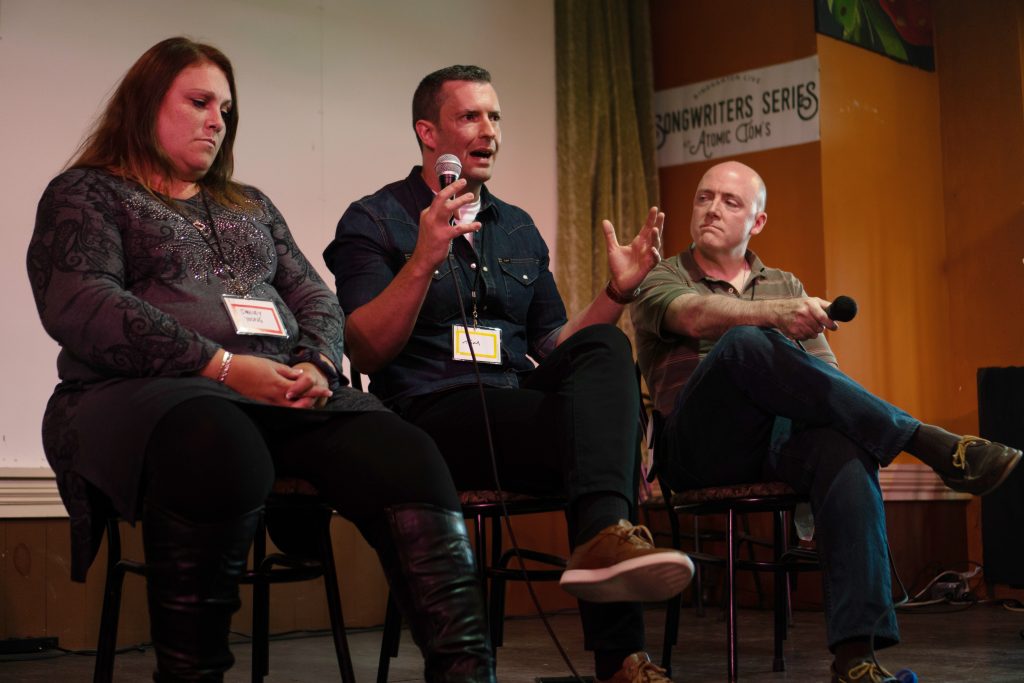In celebration of the 60th anniversary of “The Twilight Zone,” fans from the United Kingdom, Belgium, Canada and all over the United States gathered this weekend to honor creator Rod Serling’s legacy.
Binghamton’s Serling Fest, held annually since 2017, is hosted by the Rod Serling Memorial Foundation. While 2017’s festival lasted only one day and 2018’s lasted two, “The TZ@60” spanned three days, with events held at Atomic Tom’s on Friday, the Broome County Forum Theatre on Saturday and the Helen Foley Theatre at Binghamton High School on Sunday.
Andrew Polak, 58, president of the Rod Serling Memorial Foundation and a Binghamton resident, said the event has been able to grow because of the close-knit community surrounding Serling’s work.
“There’s a really big online presence of fans; there’s a dozen ‘Twilight Zone’ Facebook pages and we all just keep in touch with each other,” he said. “This is a good way for a lot of fans to get together.”
Attendees sat in on panels and presentations from “Twilight Zone” scholars and podcasters, pausing between programs to browse displays of Serling memorabilia and get books signed by featured authors. Panels focused on both Serling himself and his works, including “The Twilight Zone” and the horror anthology series “Night Gallery,” which turned 50 this year. Bill Mumy, who acted in “The Twilight Zone” as a child, called in via satellite for a discussion on Saturday. Fans young and old, mostly of “The Twilight Zone,” had opportunities to explore the Serling-verse past the show’s original run of 156 episodes.
Willow Katz, 44, of Texas, who has seen all 156 episodes at least a few times over, found out about the festival through the “Twilight Zone” podcast.
“It’s huge that after so many years people are still so affected by it and passionate about the show,” Katz said.
Cassie May, 19, of Auburn, New York, proudly showed off her “Twilight Zone” nail art and Rod Serling phone wallpaper. She said she revisited the show as a teenager after watching it with family as a child, and Serling’s writing challenged her assumptions about mid-century television.
“[Serling] was a pioneer, and especially since I know more about him, I know he really didn’t dig censorship,” she said. “He definitely wanted to talk about more, but he couldn’t, so he had to disguise it.”
Discussions touched upon Serling’s similarities to Charles Dickens, the series’ themes of nuclear anxiety and its influence on 21st century media, with Jordan Peele’s 2019 reboot being an especially hot topic.
Martin Grams, 42, of Maryland and author of “The Twilight Zone: Unlocking the Door to a Television Classic,” said the show’s influence can be seen not only in new iterations, but in its status as a gold standard for media.
“It’s amazing how many shows will be produced and they’ll have a quote from some reviewer saying it’s the new ‘Twilight Zone,’ even though it has nothing to do with it, but they feel that’s the biggest compliment they can get, so I see it for television ads all the time,” he said.
On Friday, performers from Bold Local Artists of the Southern Tier (BLAST) performed a dramatic reading of “The Happy Place,” an unproduced, never-released script that was originally meant to serve as the pilot of “The Twilight Zone.” Liam Roma, a Binghamton High School student who performed, has a coincidental connection to Serling — his grandfather, William Fitzgerald, hailing from Vestal, was stationed with him during World War II. Fitzgerald’s name was used in “The Purple Testament,” a “Twilight Zone” episode about a World War II soldier who can sense impending deaths in his platoon.
Serling moved to Binghamton from Syracuse as a toddler, spending his youth in the city before joining the army after high school graduation. Helen Foley, a schoolteacher whom Serling was especially fond of, started the memorial foundation in 1985, 10 years after Serling’s death. The influence of Binghamton on Serling’s writing can be seen in the “Twilight Zone” episode “Walking Distance,” in which a man travels back in time to find his childhood self riding a carousel said to have been inspired by the one in Recreation Park.
Serling’s daughter, Anne Serling, author of “As I Knew Him: My Dad, Rod Serling,” said “Walking Distance” was probably the most autobiographical “Twilight Zone” episode that her father wrote.
“He said he had a propensity to write about the past,” she said. “He had a very idyllic childhood and loved Binghamton.”
In the closing narration of “Walking Distance,” Serling describes the episode’s main character as “successful in most things, but not in the one effort that all men try at some time in their lives — trying to go home again.” A quote from Serling on display at the fest echoes this view of the hometown as a universal source of comfort: “In the strangely brittle, terribly sensitive makeup of a human being, there is a need for a place to hang a hat, or a kind of geographical womb to crawl back into, or maybe just a place that’s familiar because that’s where you grew up … For whatever else I may have had, or lost, or will find, I’ve still got a hometown.”



